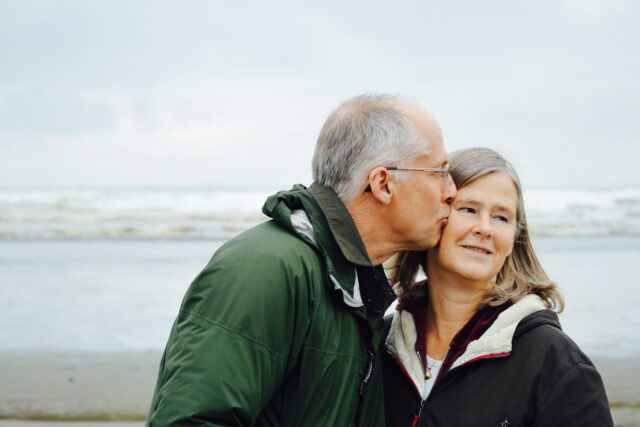17 Uncomfortable Truths About Aging That Society Often Avoids Discussing
 Unsplash
Unsplash Aging is a reality that we all have to deal with, but it’s not always a topic that people are eager to discuss. Society often paints a rosy picture of the golden years, but the truth is, aging comes with its fair share of challenges and uncomfortable realities. It’s time to have an honest conversation about the things that no one likes to talk about when it comes to getting older. Here are 14 uncomfortable truths about aging that society often avoids discussing.
1. Your body will change, and not always in ways you like.
As you age, your body goes through a lot of changes, and not all of them are pleasant. You may notice wrinkles, age spots, and sagging skin. Your hair may thin or turn gray. You may experience joint pain, stiffness, and decreased mobility. These changes can be difficult to accept, especially in a society that places so much value on youth and beauty. But the reality is, they’re a normal part of the aging process, and there’s no shame in embracing them.
2. Your memory may start to fade.
One of the most common complaints among older adults is memory loss. As you age, your brain undergoes changes that can affect your ability to remember things. You may find yourself forgetting names, misplacing items, or struggling to recall events from the past. While some memory loss is normal, more severe cases may be a sign of dementia or Alzheimer’s disease. It’s important to stay mentally active and engaged as you age to help keep your brain sharp.
3. Your intimate life may change.
Contrary to popular belief, intimacy doesn’t have to stop as you get older. However, it may change in ways that you didn’t expect. Men may experience erectile dysfunction or decreased libido, while women may experience vaginal dryness or pain during intercourse. These changes can be frustrating and embarrassing, but they’re also incredibly common. The key is to communicate openly with your partner and be willing to explore new ways of expressing intimacy.
4. You may experience loneliness and isolation.
As you age, your social circle may start to shrink. Friends and loved ones may pass away, move away, or become less available due to their own health issues. This can lead to feelings of loneliness and isolation, which can have a serious impact on your mental and physical health. It’s important to make an effort to stay connected with others, whether it’s through social clubs, volunteer work, or simply reaching out to friends and family.
5. You may have to deal with chronic health issues.
While some people are lucky enough to enjoy good health well into their golden years, many older adults have to deal with chronic health issues. According to the National Council on Aging, approximately 80% of older adults have at least one chronic disease, and 68% have two or more. These conditions can range from arthritis and diabetes to heart disease and cancer. Managing chronic health issues can be a full-time job, and it can take a toll on your quality of life.
6. You may have to face your own mortality.
One of the most uncomfortable truths about aging is that it brings you closer to the end of your life. As you get older, you may start to think more about your own mortality and what legacy you want to leave behind. This can be a scary and overwhelming prospect, but it can also be an opportunity to reflect on your life and make the most of the time you have left. It’s important to have honest conversations with your loved ones about your wishes for end-of-life care and to make sure your affairs are in order.
7. You may have to deal with ageism and discrimination.
Unfortunately, ageism is a very real problem in our society. Older adults often face discrimination in the workplace, in healthcare settings, and even in their personal lives. People may assume that you’re incapable of learning new things, that you’re out of touch with technology, or that you’re a burden on society. These stereotypes can be hurtful and damaging, but it’s important to remember that they’re not true. You have just as much value and worth as anyone else, regardless of your age.
8. You may have to redefine your purpose and identity.
When you get older, your roles and responsibilities may change. You may retire from your job, become an empty nester, or lose a spouse or partner. These transitions can be difficult and may leave you feeling lost or unsure of your purpose in life. It’s important to take the time to rediscover your passions and interests and to find new ways to contribute to society. Whether it’s volunteering, pursuing a hobby, or starting a new career, there are endless opportunities to find meaning and fulfillment in your later years.
9. You may have to ask for help.
One of the hardest things about aging is admitting when you need help. Whether it’s with daily tasks like cooking and cleaning or more complex issues like managing your finances or healthcare, there may come a time when you need to rely on others for support. This can be a blow to your pride and independence, but it’s important to remember that asking for help is a sign of strength, not weakness. There are many resources available to older adults, including in-home care services, assisted living facilities, and support groups.
10. You may have to deal with the loss of loved ones.
As you age, you may experience the loss of friends, family members, and even your spouse or partner. Losing a loved one is never easy, but it can be especially difficult as you get older. You may find yourself grappling with feelings of grief, loneliness, and even guilt. It’s important to allow yourself to feel these emotions and to seek support from others who understand what you’re going through. Many older adults find comfort in grief support groups or therapy.
11. Your financial situation may change.
Retirement can bring a lot of changes to your financial situation. You may have to adjust to living on a fixed income, which can be challenging if you’re used to a certain lifestyle. You may also have to deal with rising healthcare costs or unexpected expenses. It’s important to plan ahead for your financial future and to be realistic about what you can afford. Seeking the advice of a financial planner or advisor can be helpful in navigating these challenges.
12. You may have to confront your own biases and prejudices.
As you age, you may find yourself confronting your own biases and prejudices about aging and older adults. You may catch yourself making assumptions about what older people are capable of or how they should behave. It’s important to challenge these stereotypes and to recognize that age is just a number. Every person is unique and has their own strengths, experiences, and perspectives to offer, regardless of their age.
13. You may have to deal with the healthcare system.
Navigating the healthcare system can be a challenge at any age, but it can be especially daunting as you get older. You may have to deal with multiple doctors, medications, and treatments, which can be overwhelming and confusing. It’s important to be an active participant in your own healthcare and to advocate for yourself when necessary. Don’t be afraid to ask questions, seek second opinions, or speak up if something doesn’t feel right.
14. You may have to face the fact that life is unpredictable.
Perhaps the most uncomfortable truth about aging is that life is unpredictable. No matter how well you plan or how healthy you are, there are no guarantees. You may experience unexpected health issues, financial setbacks, or personal losses, the WHO explains. The key is to focus on what you can control and to find ways to adapt and cope with whatever challenges come your way. Surround yourself with supportive people, maintain a positive outlook, and don’t be afraid to ask for help when you need it.





